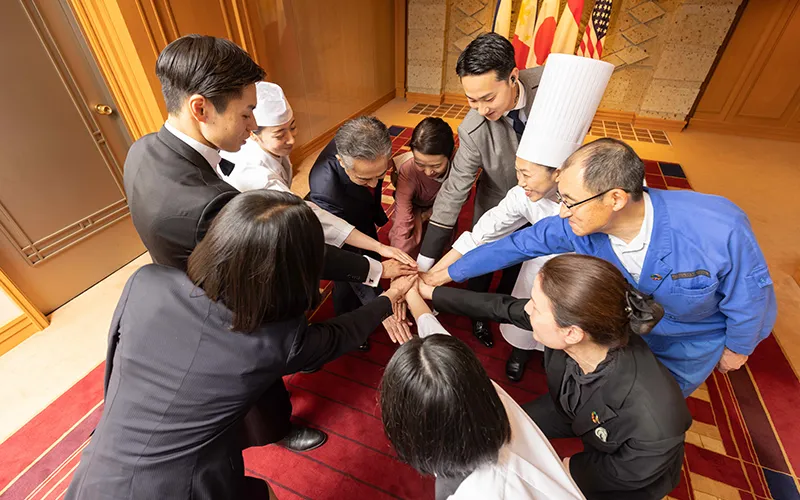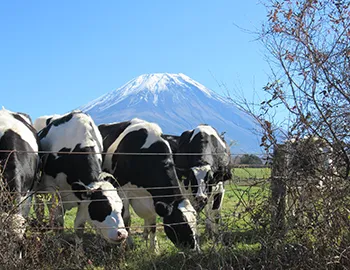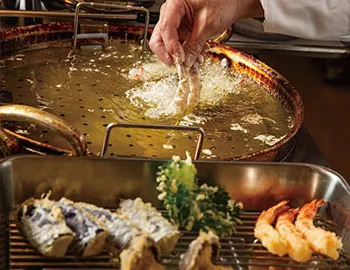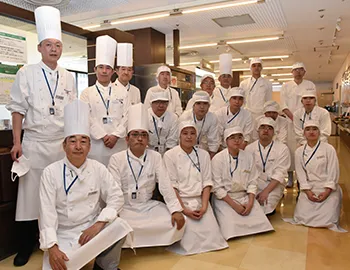SustainabilityEnvironmental Initiatives
Our group believes that environmental consideration is one of the new hospitality services that society expects.
Therefore, we have established the SDGs Team, the 3R Team and the Energy Conservation Team under the Sustainability Management Committee chaired by the President, and each team is formulating respective action plans and promoting each initiative across the company.


Introduction of Renewable Energy
We use carbon-neutral LNG (liquefied natural gas) for kitchen gas (Tokyo and Osaka), and use 100% renewable energy for our events, electric car charging stations, chandeliers, and monument clocks (Tokyo).

Measures to Prevent Food Loss
The Imperial Hotel is focusing efforts on "food loss reduction" based on the idea of "changing society in a delicious way." Each department is advancing initiatives such as finding ingenious ways to use food materials without unnecessary waste during cooking, the development of upcycled products and the introduction of order-based buffet services, etc.
Food recycling loop from used coffee grounds
Imperial Hotel, Tokyo is proceeding with action for a reusing project plan (food recycling loop) in which we take coffee grounds left over after brewing coffee in the banquet halls and restaurants, recycle them as cattle feed, and purchase the milk from dairy cattle raised on that feed.
By becoming a Certified Food Recycling Loop Operator in collaboration with recycling organizations and dairy farmers, and by forming new partnerships, we are promoting a supply chain that considers sustainability.

Recycling used cooking oil into sustainable aviation fuel (SAF)
By producing Sustainable Aviation Fuel (SAF) made from used cooking oil, we are participating in the project that aims for a decarbonized society called the Fry to Fly Project.
We collect used cooking oil from the Imperial Hotel Tokyo, the Imperial Hotel Osaka, and The Crest Hotel Kashiwa and recycle it into SAF, which is then used as aviation fuel.
By helping with actions to decarbonize a form of travel that is closely linked to the hotel industry, we are promoting sustainable tourism.


Utilizing Food Losses as Environmentally Recyclable Vegetables
Since 2007, food waste from restaurants and banquet halls has been dried on-site and converted into fertilizer for vegetable cultivation via partner companies.
Vegetables harvested with the fertilizer are purchased as environmentally recyclable vegetables and are used in some of the restaurant menus.
Sustainable Salt
The peel of vegetables, fruit clusters, and crustacean shells are baked in a low-temperature oven to form a powder, which is mixed with salt and used in cooking as a proprietary salt.
This is available as a product in our hotel shops and a portion of the proceeds from the sales is donated to JEAN, an incorporated association that promotes environmental protection.

Delicious and Sustainable W・E Bread
The Imperial Hotel Tokyo has developed W・E Bread as a white bread with a new texture that does not generate waste materials, and has introduced it to the sandwich products served in the building.
In the past, bread crusts had been cut off in pursuit of aesthetics and texture, but we developed a bread that inherits the traditional style and taste while also contributing to a reduction of food loss.
With this bread, we aim to reduce food loss by about 2.5 tons per year.

Insourcing Our Employee Cafeteria
The employee cafeterias in Tokyo, Osaka and Kamikochi are operated directly by the company and use offcuts and unsold products that would have been discarded in the past for their menus.
In addition, it is a venue where the cooking staff are able to offer menu items that they themselves have proposed and developed.

Thorough Separation of Waste
We separate about 20 types of waste under the slogan "Garbage when mixed, valuable when separated." As part of our efforts to maximize the amount of recyclable waste, we engage in waste reduction by conducting sorting surveys in the waste disposal rooms and at each workplace, and by displaying easy-to-understand waste sorting signs.
Serving Environmentally Friendly Coffee
We are the first hotel in Japan to start serving farm-produced coffee bearing the Rainforest Alliance Certificate.
This is a certificate that indicates forest conservation and a healthy working environment for farmers, and this coffee is served in our banquet halls and some of our restaurants.
Promotion of Food Diversity
From the "Leave no one behind" viewpoint of the SDGs, we expanded our vegan menu lineup from October 2022, so that all customers from Japan and overseas can enjoy their meals with peace of mind.

Reduction of Plastic Use
In accordance with the Plastic Resource Circulation Act enacted in April 2022, we are gradually switching 12 types of guestroom amenities and other items covered under the act from plastic to alternative materials.
In FY2022, we reduced plastic usage by 69.6% (11 tons). In FY2024, we achieved an 87.7% reduction (13.9 tons), meeting our target of an 87.5% reduction compared to FY2019.

